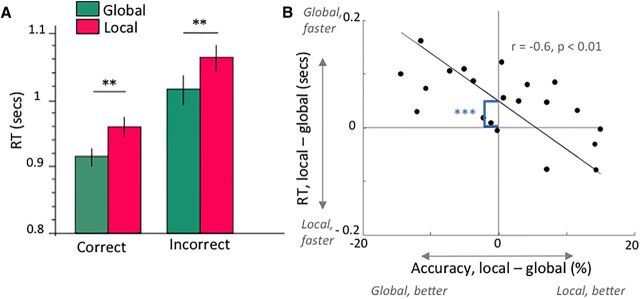Figure 3.
Experiment 1. Subjects are faster to report the global orientation. A, Reaction times in the global and local tasks, for both correct (left) and incorrect (right) trials. Reaction times in the global task were shorter. B, Difference in reaction times between the local and global tasks as a function of the difference in accuracy. The two variables are significantly linearly correlated (strength of the correlation: r = −0.6, p < 0.01) with a negative slope, showing that subjects who were faster at the global task were also more accurate. The significantly positive intercept indicates that an ideal subject with strictly identical accuracies at the local and global tasks would be 0.049 s faster in the global task. **p < 0.01. ***p < 0.001.

